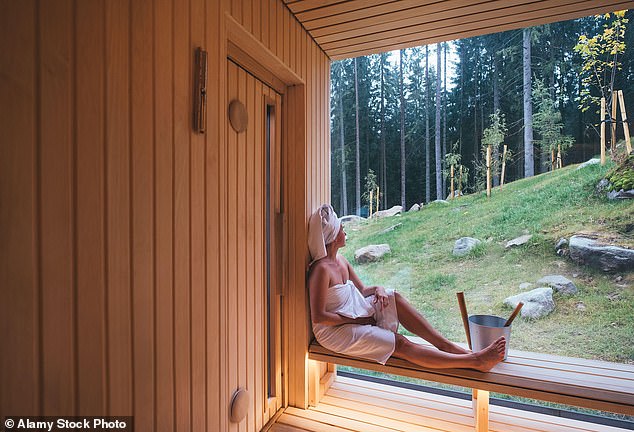The Surprising Health Benefit of a Separate Duvet from Your Partner—and Four Other Natural Ways to Improve Your Well-Being and Mood




Judging by the moderate autumn weather, summer is now officially over – and with it the natural boost it gives to our health.
Brits get most of their vitamin D between March and September. The nutrient is produced through exposure to sunlight and is vital for bone and muscle health, as well as affecting energy levels.
Pleasant weather encourages people to go outside and exercise. And autumn heralds the arrival of cough and cold season. Research also shows that cold and wet weather worsens our mood.
Luckily, it’s not all bad news. Experts say there are simple steps people can take to replicate that feel-good summer boost, even as the nights get longer.
Join a choir (or go to a comedy) to fight the winter blues
One in five Britons experience low mood during the autumn and winter – a phenomenon known as seasonal affective disorder (SAD) which also leads to a drop in energy levels.

Watching a stand-up comedian like Michael McIntyre can also improve your mood
The cause isn’t entirely clear. But research suggests that a lack of sunlight can lead to lower levels of the hormone serotonin, which is linked to mood and sleep and can cause depression.
Some patients are prescribed antidepressants, but experts say these are not always necessary.
Research even suggests that joining a choir can release endorphins, a chemical that relieves pain and stress, leading to greater happiness and overall well-being.
An Italian study found that older people who sang in a group every week had significant reductions in anxiety and depression within just three months.
‘Singing is so positive for your mental health,’ says Dr Nisa Aslam, a GP from Watford. ‘Not only does it put you in a better mood, but it also gives older people the chance to communicate with others, which is so important at that age.’
A Finnish study found that watching stand-up comedy with friends can also improve your mood.
Buy separate duvets to give your immune system a boost in time
It’s a discussion that all couples will recognize: is the bed too warm?
Research shows that women are more sensitive to temperature fluctuations in the bedroom than men.
A US study found that almost a fifth of women feel too hot when trying to sleep, compared to only a tenth of men.
This can significantly impact sleep quality, which in turn weakens the immune system and increases the risk of winter viruses, according to a sleep medicine expert at the University of Oxford. Professor Colin Espie says sleep plays a “critical role” in infection control, adding: “Good sleep promotes the distribution of immune cells (lymphocytes) and the production of protective cells (cytokines).”
Experts recommend that couples purchase separate duvets that suit their individual needs.
‘Some people need a 4.5 tog duvet all year round, while others need a warmer 13.5 tog duvet,’ says sleep behavioural expert James Wilson, better known as The Sleep Geek.
‘It only takes a change in your core temperature of about 0.5 degrees to wake you up, so the right duvet can really make a difference.’
Climb the stairs to increase your winter activity
As temperatures drop, so do our activity levels, with older people especially concerned about slipping and falling on icy pavements.
But it is crucial to maintain good fitness as this reduces the risk of conditions such as heart disease and diabetes.
Experts say it is possible to reap the benefits of exercise by doing activities indoors. This could be lifting weights or using resistance bands, or it could be as simple as climbing stairs.
Researchers from the University of East Anglia found that people who regularly climb stairs are 25 percent less likely to die young than those who avoid stairs.
They say it is linked to a lower risk of cardiovascular disease, including heart attacks, heart failure and stroke.
And even ten minutes of light to moderate stair climbing provides a bigger energy boost than a dose of caffeine, according to a US study. Cardiologist Dr Malcolm Finlay from Barts Health NHS Trust said: ‘Exercise is the best medicine in the world and I would strongly encourage people to use the stairs where possible.’
Follow a tip from the Scandinavians… and visit a sauna regularly
Visiting a sauna can reduce the risk of heart disease and stroke. And even spending 15 minutes in a sauna, five days a week, can help relieve mild symptoms of depression, research shows.
It’s no wonder they are so popular in Finland, where winter temperatures can often drop to minus 40 degrees Celsius and some parts of the country experience near darkness for 50 days a year.
Finland has topped the world happiness rankings for six years. But whatever the cause of this joy, the health benefits of saunas are thought to stem from lowering blood pressure.

Visiting a sauna can reduce the risk of heart disease and stroke. And even spending 15 minutes in a sauna, five days a week, can help relieve mild symptoms of depression, research shows.
Saunas are safe, even for the elderly. However, it is important to take precautions.
“People who go to the sauna should make sure they drink enough water,” says Dr. Finlay.
‘And if you haven’t been to the sauna before, you should be careful not to stay in there too long.’
Try other ways to boost your vitamin D levels
One in six adults in the UK, and almost a fifth of children, are vitamin D deficient. The NHS recommends that everyone take a vitamin D supplement during the dark autumn and winter months.
Several studies show that the daily tablets can increase bone and muscle strength and combat fatigue in people suffering from a deficiency.
“When the sun goes down in the UK your vitamin D levels drop rapidly,” says Doncaster GP Dean Eggitt.

Vitamin D supplements are recommended by the NHS during the autumn and winter
He explains that most people become vitamin D deficient in winter and that this ‘has consequences for our physical and mental health’.
Some experts, including epidemiologist Professor Tim Spector, founder of the Zoe diet app, suggest that eating more oily fish and mushrooms – both of which naturally contain vitamin D – may be even more effective than supplements.
Professor Spector and his wife, dermatologist Dr. Veronique Bataille, also recommend not using sunscreen in winter, so that sunlight, however weak, can penetrate the skin and produce vitamin D.
Dr Eggitt agrees that you can get vitamin D from foods such as fish and mushrooms, but he cautions that you would have to eat ‘huge amounts to get the amount you get from the tablets’.
He adds: ‘That’s why GPs so often prescribe vitamin D supplements – and we see the difference it makes.’




